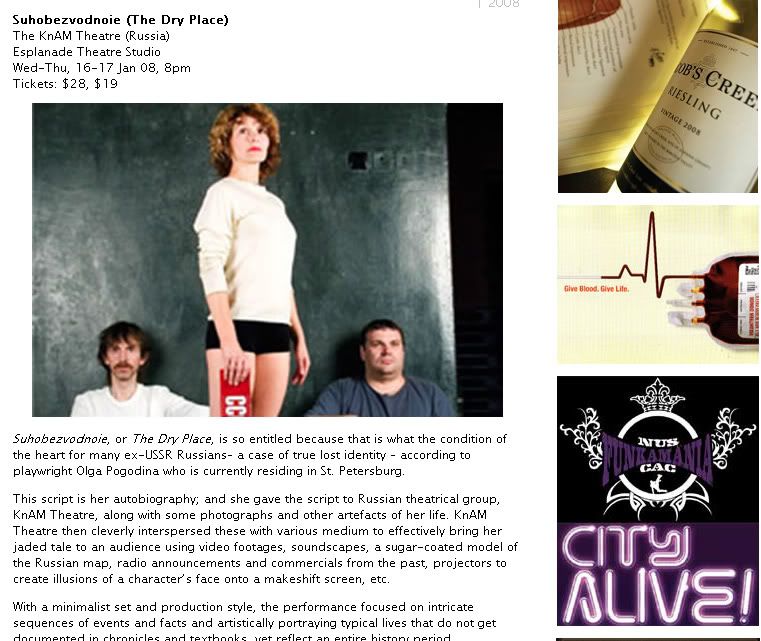сухобезводное

Suhobezvodnoie, or The Dry Place, is so entitled because that is what the condition of the heart for many ex-USSR Russians- a case of true lost identity - according to playwright Olga Pogodina who is currently residing in St. Petersburg.
This script is her autobiography; and she gave the script to Russian theatrical group, KnAM Theatre, along with some photographs and other artefacts of her life. KnAM Theatre then cleverly interspersed these with various medium to effectively bring her jaded tale to an audience using video footages, soundscapes, a sugar-coated model of the Russian map, radio announcements and commercials from the past, projectors to create illusions of a character’s face onto a makeshift screen, etc.
With a minimalist set and production style, the performance focused on intricate sequences of events and facts and artistically portraying typical lives that do not get documented in chronicles and textbooks, yet reflect an entire history period.
The protagonist and narrator, Olga, speaks of her brother in jail who writes to her frequently, pleading her to write more and always asking for her to send him packages of cigarettes, cakes, spectacles and so on yet always ending off with an almost ironic and hypocritical “but only if you can financially manage it.” Years later, he has served his term and Olga never hears from him again. Today, she still does not know where he is.
The central theme of this play is Illusion; everything is an illusion to her: God is, and so is democracy, amongst many other things. During the discussion after the play, director Tatiana Frolova likened Russia to a sugar country which dissolves and disappears when water is added. Sugar solution slips through your fingers so easily, even though what you held in your hand a moment ago was a concrete handful of white sugar crystals. In the same way, Russians look like one people together, but this is as much an illusion as like sugar solution; in truth, they are very easily separated and divided.
The director was quick to point out during the discussion after the play that absolutely no politics was discussed in the play. So even though the names of the political leaders keep coming up on radio announcements, like in Olga’s childhood memories of listening to the radio, the point of the play was not to express any political opinion, but to paint a picture of the tiredness and futility of living - how one can just stop caring about everything; the human dilemma of existence. Seventy futile years of waiting for the fulfillment of a promise can be very exhausting.
Quoting Olga, “Authority is created in order to provide for people’s dreams”, while Communism once spelt the possibility of hope for all Russians (“they said free dolls and dresses for the dolls would be given to everyone for free”), all that waiting was for naught. Years later, they would be crushed beneath the collapsed rubble of the Soviet Union.
The Dry Place was a powerful play capable of stealing your breath and stunning you into silence right from the beginning, when the protagonist ties a garbage bag around her head (“the garbage bag of all my memories”) and the walls of the studio reverberate with the amplified sound of her heavy breathing.
At the end of the discussion, when asked if they had any last words for the audience, what they said was simple: “Thank you for understanding our story.”
http://ridgeonline.wordpress.com/2008/01/20/of-dry-places-in-jaded-hearts/
2008 год. По Сингапуру висят такие плакаты:

http://t61.livejournal.com/2008/01/14/